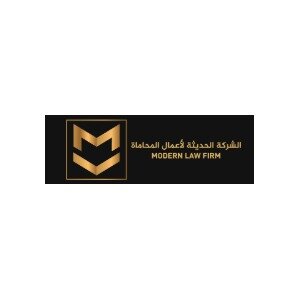Best Divorce & Separation Lawyers in Hashemite Kingdom of Jordan
Share your needs with us, get contacted by law firms.
Free. Takes 2 min.
Free Guide to Hiring a Family Lawyer
Or refine your search by selecting a city:
List of the best lawyers in Hashemite Kingdom of Jordan
About Divorce & Separation Law in Hashemite Kingdom of Jordan
The Hashemite Kingdom of Jordan's legal framework regarding divorce and separation is primarily based on Islamic law, supplemented by the Personal Status Law. Divorce in Jordan is largely influenced by religious principles, particularly for Muslims, while Christians and other non-Muslim populations have specific denominational regulations applied to their cases. The legal process can involve various aspects such as financial settlements, custody of children, and support responsibilities, spanning across Sharia (Islamic Jurisprudence) and civil courts.
Why You May Need a Lawyer
Navigating divorce and separation can be complex due to legal, emotional, and practical implications. You may need a lawyer in situations such as:
- Understanding the legal grounds and process for divorce in Jordan.
- Negotiating alimony, child support, and custodial issues.
- Handling complex property and asset divisions.
- Ensuring that your rights and interests are protected throughout the legal process.
- Dealing with cross-border divorces where one party is outside Jordan.
Local Laws Overview
The Jordanian Personal Status Law governs divorces for Muslims, where Sharia courts play a significant role. Key aspects include:
- Types of Divorce: Include Talaq (initiated by the husband), Khul' (mutually consented but requested by the wife), and judicial divorces for harm or absence.
- Custody: Custody decisions consider the child's best interest, typically granting primary custody to the mother until the child reaches a certain age.
- Financials: Post-divorce financial obligations may include alimony (nafaqa) and marital property division. The extent of these responsibilities can vary.
- Non-Muslims: The process for Christians and other denominations follows their respective ecclesiastical laws.
Frequently Asked Questions
What are the legal grounds for divorce in Jordan?
The grounds for divorce include mutual consent, harm or abuse, desertion, inability to fulfill marital obligations, and serious conflicts.
How long does a divorce process take in Jordan?
The duration varies depending on the case's complexity, but it typically ranges from several months to over a year.
Is it necessary to go to court for a divorce?
Yes, court involvement is required to legally dissolve a marriage, especially for judicial divorces or contested cases.
Can a wife initiate a divorce?
Yes, a wife can initiate divorce through Khul' or by seeking judicial intervention for specific valid reasons.
How is child custody determined?
Custody is typically granted based on the best interest of the child, with mothers often receiving initial custody.
What is the role of the court in property division after divorce?
The court helps determine a fair division of property and assets, considering each party's contribution and rights.
Are foreign nationals subject to Jordanian divorce laws?
Foreign nationals residing in Jordan may be subject to local laws, but international treaties and the couple’s nationality can also influence proceedings.
Can I represent myself in a divorce case?
While possible, self-representation is not advisable due to the complexity of divorce law and processes.
What happens if one spouse disagrees with the divorce?
The case becomes contested, requiring more extensive legal process and negotiation or court decision-making.
What documents are required for filing a divorce?
Documents typically include identification papers, marriage certificate, and evidence supporting claims for divorce.
Additional Resources
For more assistance, consider these resources:
- Ministry of Justice: Provides guidelines and services related to family law.
- Jordanian Judicial Council: Offers legal information and access to family courts.
- Legal Aid Services: Non-profit organizations can provide free or lower-cost legal assistance.
Next Steps
If you require legal assistance in divorce and separation, consider the following steps:
- Consult with a lawyer specializing in family law to understand your rights and obligations.
- Gather any necessary documentation relevant to your case.
- Consider mediation or counseling services if applicable, to resolve issues amicably.
- Prepare financially and emotionally for the divorce process and potential outcomes.
Lawzana helps you find the best lawyers and law firms in Hashemite Kingdom of Jordan through a curated and pre-screened list of qualified legal professionals. Our platform offers rankings and detailed profiles of attorneys and law firms, allowing you to compare based on practice areas, including Divorce & Separation, experience, and client feedback.
Each profile includes a description of the firm's areas of practice, client reviews, team members and partners, year of establishment, spoken languages, office locations, contact information, social media presence, and any published articles or resources. Most firms on our platform speak English and are experienced in both local and international legal matters.
Get a quote from top-rated law firms in Hashemite Kingdom of Jordan — quickly, securely, and without unnecessary hassle.
Disclaimer:
The information provided on this page is for general informational purposes only and does not constitute legal advice. While we strive to ensure the accuracy and relevance of the content, legal information may change over time, and interpretations of the law can vary. You should always consult with a qualified legal professional for advice specific to your situation.
We disclaim all liability for actions taken or not taken based on the content of this page. If you believe any information is incorrect or outdated, please contact us, and we will review and update it where appropriate.
Browse divorce & separation law firms by city in Hashemite Kingdom of Jordan
Refine your search by selecting a city.
















